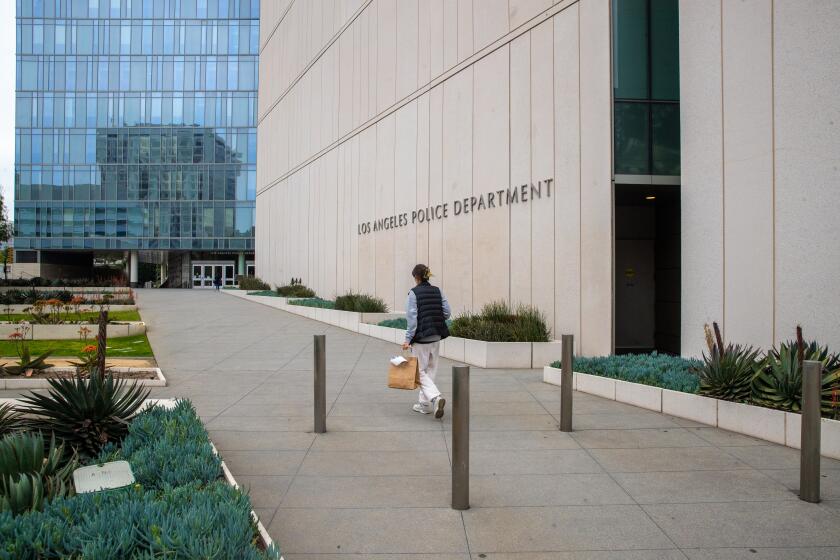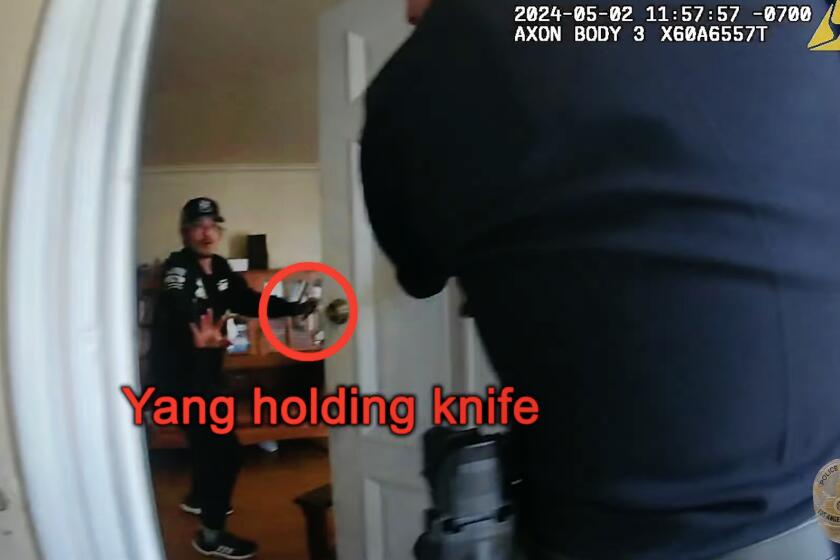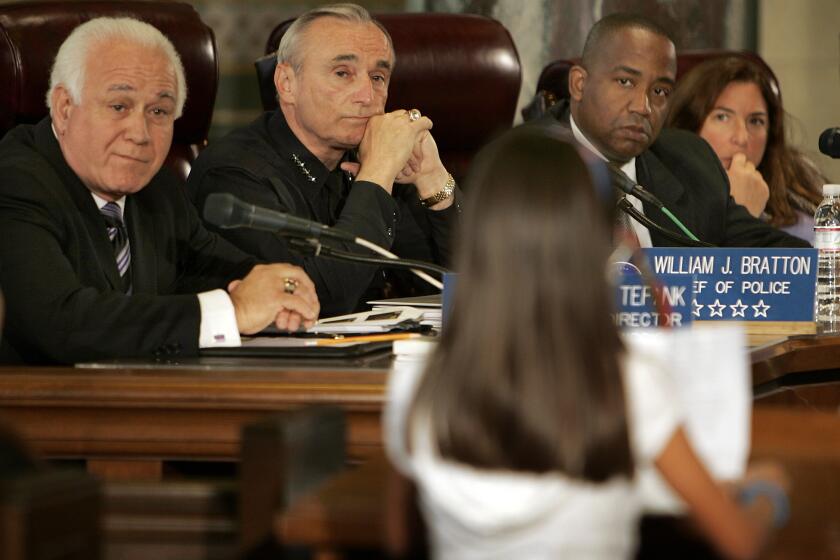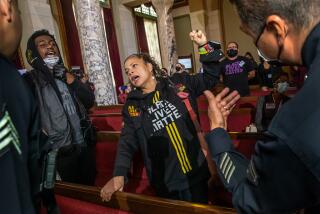Jury rules against Black Lives Matter co-founder in LAPD ‘swatting’ lawsuit
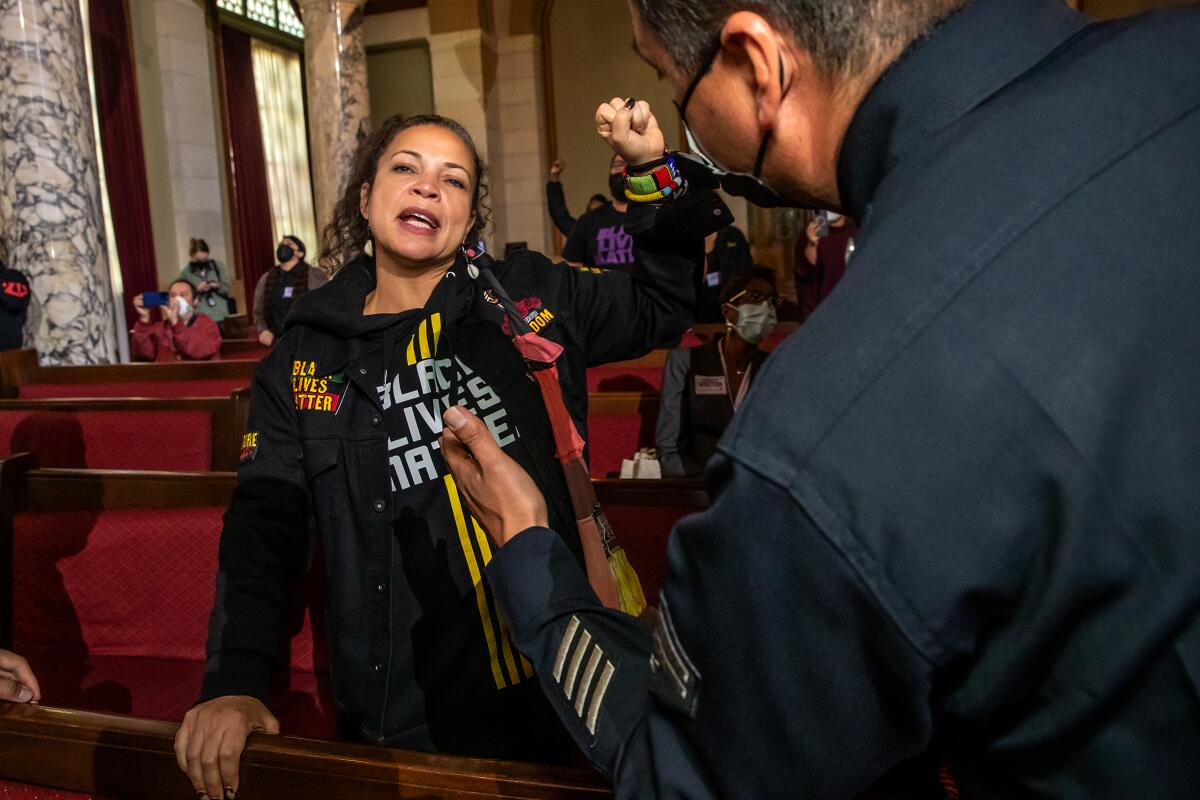
A Los Angeles civil jury ruled against Black Lives Matter-L.A. co-founder Melina Abdullah on Thursday, finding that two police officers were not liable for their response to a reported hostage situation in her home that turned out to be a false alarm.
Abdullah alleged that law enforcement’s response to the so-called swatting incident — which involved deploying officers with guns at the ready to her doorstep — was an act of intimidation in response to her high-profile advocacy against police violence.
Attorneys for the city countered that police merely were acting on the information they had at the time, which was that a caller had demanded $1 million or he would shoot the three people he’d taken hostage inside Abdullah’s home.
Los Angeles police officials are seeking to fire a senior captain after an internal investigation determined he failed to disclose a romantic relationship with a civilian employee and then lied about it to internal affairs detectives, according to three department sources.
Abdullah was accused of seeking preferential treatment, and jurors heard portions of an Instagram livestream she broadcast during the incident in which she asked her followers to contact two City Council members she was friends with and asked police, “Do you know who I am?”
In an interview after the verdict, Abdullah called the jury’s decision “dispiriting and disappointing and not surprising,” and the result of “an unjust system” protecting itself.
Her attorneys said they plan to appeal.
The 911 caller in the August 2020 incident that sparked the lawsuit spoke in a pronounced Southern accent and called himself “Dale Brooks.” In response to his hostage threat, police dispatched more than a dozen officers from the nearby Wilshire Division to Abdullah’s home, along with a helicopter, her attorneys said. They alleged that LAPD ignored signs of a hoax. The caller said he wished to “send a message” that “BLM is a bunch of retards.”
Emails to the city attorney’s office and to the two police officers named in the suit were not immediately returned.
The LAPD response to the 911 call, which came after a summer of anti-police-brutality protests that Abdullah helped organize as a leader of Black Lives Matter, drew widespread outrage, including from multiple city officials who called for an investigation.
The department moved faster than normal to release the footage of the May 2 fatal shooting of Yong Yang in his parents’ apartment.
Abdullah criticized Los Angeles County Superior Court Judge Rupert Byrdsong for what she said was an attempt to “criminalize” her supporters, who packed the courtroom every day.
On several occasions, Byrdsong paused the proceedings to admonish audience members for what he saw as disruptions in the court gallery. Los Angeles County sheriff’s deputies were stationed outside the courtroom in response, and use of phones inside was restricted. Deputies also blocked off the front row of seats with yellow crime scene tape, limiting capacity.
“I think that also tainted the jury and gave them the impression that Black Lives Matter and their supporters somehow was a danger to them,” she said.
She said the judge refused to allow the introduction of evidence showing that she was the victim of other swatting calls, including on the day after she announced her lawsuit against the city.
The trial’s five days of testimony included some tense exchanges.
During cross-examination of Abdullah, Assistant City Atty. Christian Bojorquez pointed out that she didn’t suffer any physical harm during the incident.
“Did any officers shoot you?” he asked.
“So did you want me to respond to that or is this court drama?” Abdullah said, and she asked whether the line of questioning was meant to be “further traumatizing.”
“So you’re traumatized by the questions that I’m asking you here in court?” Bojorquez responded.
Following a string of departures, Los Angeles faces an unprecedented three vacancies in key police leadership and oversight positions.
Bojorquez later played video from Abdullah’s livestream on Instagram, which captured her laughing as she walked back toward her house after speaking to officers. He commented that it didn’t appear as though she had suffered any great trauma, as her lawsuit claimed. She said that everyone responded to trauma differently, including in ways such as laughter that are in contrast with the gravity of the moment.
Abdullah said Thursday that the questioning she faced was the continuation of a larger pattern of harassment and intimidation.
“It was beyond disrespectful, it was berating, it was dehumanizing,” she said. “I think we were reminded that even with a lawsuit you’re asking an unjust system to hold itself accountable, because the court absolutely permitted that to happen.”
More to Read
Sign up for Essential California
The most important California stories and recommendations in your inbox every morning.
You may occasionally receive promotional content from the Los Angeles Times.
